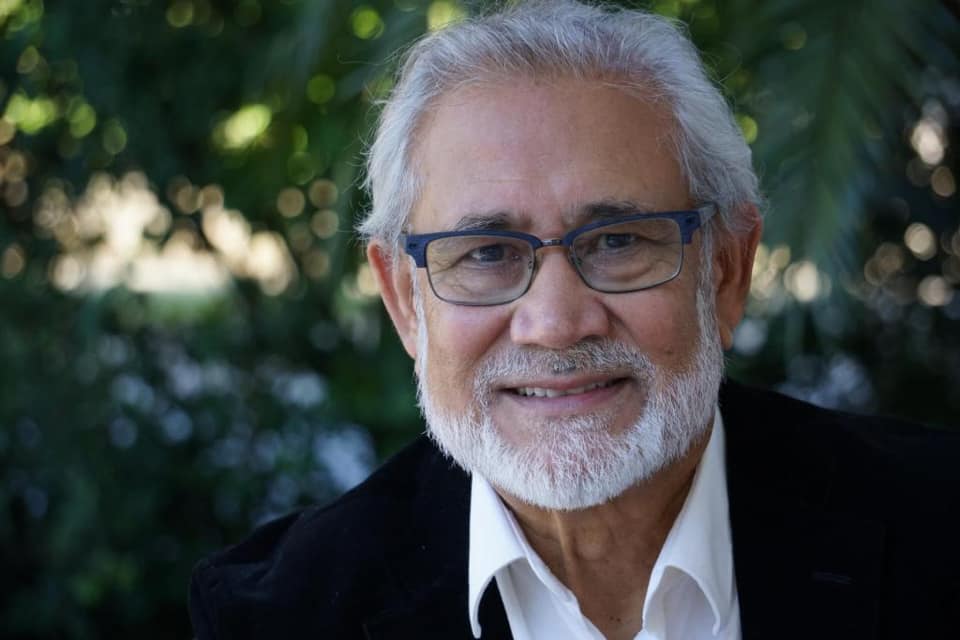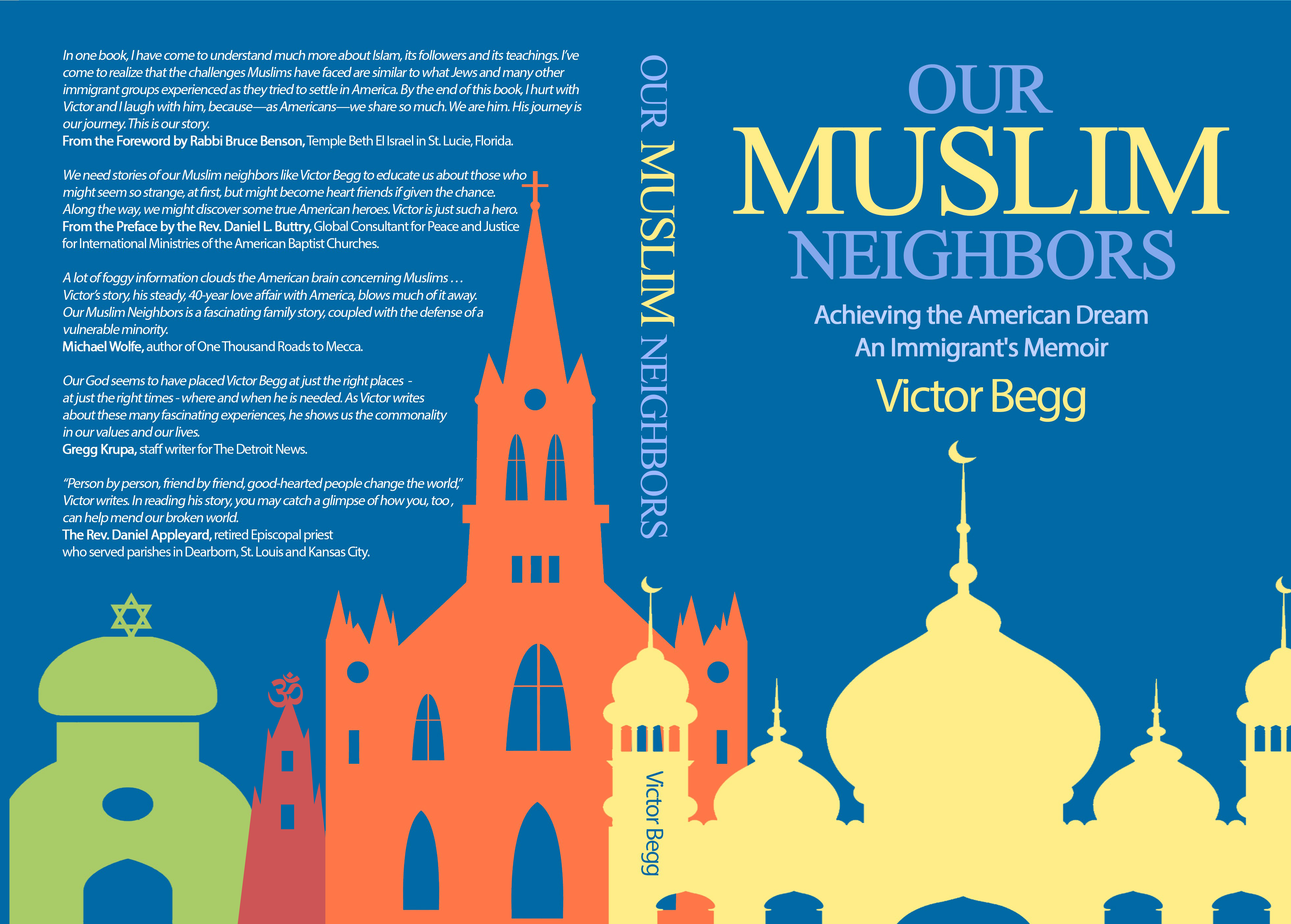Arriving in 1970, Victor (Ghalib) Beggsuccessfully built a chain of thriving furniture stores. Using his entrepreneurial skills, he co-founded an ethnically diverse mosque and influential community organizations in Metro-Detroit. Along the way, he discovered that America’s greatest promise lies in building healthy communities with our neighbors.The American Dream is alive and well in this memoir of a Muslim immigrant from India who arrived in America planning to start a business and raise a family, working so hard toward his personal goals that he even pumped gas and sold vacuum cleaners door to door. Our Muslim Neighbors: Achieving the American Dream, An Immigrant’s Memoiris a true-blue story of an entrepreneur,activist,author, columnist, community builder/organizer.
I am an accidental activist.
I arrived in America at Kennedy Airport in 1970 as a student en route to the University of Detroit Mercy—barely noticing the Twin Towers rising against Manhattan’s skyline. The North Tower wouldn’t be completed until that December; the South Tower took another year. The American Dream was calling me as it had called millions of immigrants before me. I could see the path so clearly: become a citizen, raise a family, lead a good life and help my neighbors build a healthy community for all of us. As I carried my luggage and my hopes toward Detroit, I knew that I was right on track. The next decade strengthened that confidence: I met my wife in graduate school, we started a business upon graduation, we raised children. I was able to give back to our community.
My story might have started and ended much like the stories of your ancestors—fondly remembered by family and friends but unremarkable to most readers. Then, just as the new millennium was dawning, a man who claimed to profess my faith sent his followers to attack American landmarks, including those iconic Twin Towers. Suddenly, my faith was part of horrific headlines on a daily basis, thousands of Muslim neighbors coast to coast instantly were regarded with suspicion—and I became a voice of America’s real Muslim community.
September 11, 2001, was the first day of a new calendar for all American families, including those like my own, who truly follow the faith of Islam. Soon, our nation would engage in a series of overseas wars. Muslim Americans would be viewed as a suspect community, our constitutional rights violated with impunity in far too many cases. Like most Americans, I had always contributed to community institutions. As a successful businessman, I had even more opportunities to serve during the booming era of the 1980s and 1990s. I became active in the Republican Party, was appointed by the governor to Michigan’s Community Service Commission and, like many Americans in the 1990s, I helped to build a new suburban congregation—in our case, a mosque.
After what became known simply as “9/11,” Muslims like me were catapulted into the role of defending our cherished American values of freedom and equality—on a national stage with extremely high stakes. That certainly wasn’t part of my American Dream when I first set foot on these shores, but life in this turbulent era led me step by step, from one moment to the next, until … until … well, until one day I woke up staring at an entirely new landscape for Muslim-American relations and I found myself accidentally in a very public arena. I am proud of how I responded, but this was not the trajectory I had envisioned half a century ago.
There was no way to see those explosive events on 9/11 coming. Even our government’s intelligence experts did not take the threat seriously, much to our regret in the investigations that unfolded after the attacks. And that, too, is part of this story. I understand why our leaders couldn’t fully envision what happened that day. There is nothing inherent in Islam that produces violence—just as there is nothing at the core of Christianity that inevitably produced the Inquisition or the Crusades or the KKK or the Christian churches in Germany that backed Hitler’s regime. Quite the opposite! There is a strong tradition in both of our faiths that sees America as an ideal land that embodies our core spiritual values and gives our families the freedom to pursue happiness even in the midst of our diversity.

I may be preaching here, unintentionally. I wrote this book to provide a window into the family, community and spiritual values of ordinary Muslim families. I don’t expect everyone to love Muslims, but research shows that men and women who don’t know a Muslim are more likely to express hostility toward us. One Pew study showed that only about one-third of Americans have had meaningful contacts with Muslims. That leaves a majority of Americans more prone to adopting without question the myths and biases so prominent in contemporary media. Rather than fading in the years since 9/11, 2018 ushered in a new era of demonizing our neighbors with efforts to establish a Muslim travel ban or add other restrictions based on one’s faith or country of origin. I hope that as you read this heartfelt story, you will discover how much we share.
It’s hard to recall, today, America’s high hopes in the 1990s for world peace, democracy, freedom and cultural diversity. Here’s a reminder: I appeared in a 1994 cover story in U.S. News & World Reportabout how much all Americans share in their deepest spiritual desires. In that story, seven years before 9/11, I told the magazine’s millions of readers: “It’s very easy to be a Muslim in the United States.” I had no reason to question that assertion.
We need to reclaim that earlier optimism and that focus on our shared values. In these pages, I hope you will feel right at home. As a Muslim, I am happy to tell people about achieving the American Dream—and I frequently do so when I am invited to speak to groups. Now, as a senior citizen, I enjoy living in a beach condo in Florida. But my retirement plans are on hold because of the renewed prejudice stoked by the toxic attitudes so publicly proclaimed these days toward people perceived as foreigners. So, I continue to claim my status as a proud American—and my obligation as an accidental activist. For my part, I am sharing this story with readers in the hope that one day we all will see our grandchildren living in peace, free from any guilt by association.




